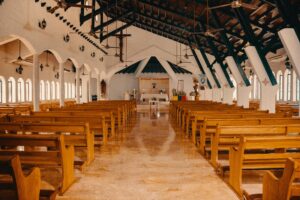
Have you ever struggled with God after losing someone you love? Many have—especially when they’ve prayed, believed, and stood for healing. And yet, Scripture says something that often goes unnoticed.
Good people pass away;
the godly often die before their time.
But no one seems to care or wonder why.
No one seems to understand
that God is protecting them from the evil to come.
For those who follow godly paths
will rest in peace when they die.
Isaiah 57:1-2 (NLT, emphasis mine)
“No one seems to understand that God is protecting them from the evil to come.”
One day, the Holy Spirit lit up this verse for me. Given how evil the world has become since my mother passed, I’ve wondered if, in His mercy, He spared her from the horrific shift in culture that was coming.
Then there’s my husband, whose on-again-off-again relationship with God was “on” when he passed away. I believe God, in His kindness, let Jack go home at a time when his heart was right with Him.
These are my theories anyway.
But what about the rest of those who go before their time? I don’t know.
What I do know is that, while God can certainly handle our anger when we lose someone, being angry with God wounds our own hearts and strains our fellowship with Him. I’ve found a better way to handle the battles we fight, not just things like cancer and death, but everything. And that way requires being proactive.
The way the three Hebrew boys were proactive in Daniel 3:16-18 (NLT):
Shadrach, Meshach, and Abednego replied, “O Nebuchadnezzar,
we do not need to defend ourselves before you.
If we are thrown into the blazing furnace,
the God whom we serve is able to save us.
He will rescue us from your power, Your Majesty.
But even if he doesn’t,
we want to make it clear to you, Your Majesty,
that we will never serve your gods
or worship the gold statue you have set up.”
Here, In Daniel 3, Shadrach, Meshach, and Abednego declared, “But even if He doesn’t…”
For years, these five words confused me. I’ve tried to watch what I say because I know our words have power—power for good and power for evil—and the last thing I want to do is empower the enemy. But I’ve realized something.
These words? They don’t empower the enemy at all. They strip him of his power.
Think about it.
But even if He doesn’t.
These three young men weren’t telling Nebuchadnezzar they doubted their God’s ability or willingness to save them. They were informing him that they would continue to serve their own God faithfully—unconditionally. There was zero chance that they would worship the king’s gods or bow before his idol.
Nebuchadnezzar had used the only threat he had, and it had proven worthless.
I assume you know this part of Israel’s history but if not, I encourage you to open the book of Daniel and read it—especially to see how their experience changed things for everyone. These three boys were, indeed, sent into the furnace. But instead of being incinerated like the soldiers that threw them in, these three were set free to hang out in the furnace with Jesus.
With Jesus.
When they finally came out, which didn’t happen until Nebuchadnezzar called them, they didn’t even smell of smoke.
But even if He doesn’t.
We can, and should, use these words in all our battles.
But even if He doesn’t heal our friend, we will not bow to you, Anger!
But even if our baby doesn’t make it, we will not bow to you, Doubt!
But even if we lose everything, we will not bow to you, Despair!
Devil, no matter what, you will not win!
When we choose ahead of time to hold fast to our faith in God no matter what, the situation may not seem to change, but we do.
- Rather than being weakened victims, we become victorious warriors.
- Instead of reacting to our situations, we hold our ground and actively fight the devil on a whole new level.
- Even when we don’t get the answers we want, we stand strong.
Whatever we face, no matter how dire it is, having the attitude, “Our God is able, but even if He doesn’t…” puts the enemy on notice from the start.
Celebrating Jesus!
Tammy C






